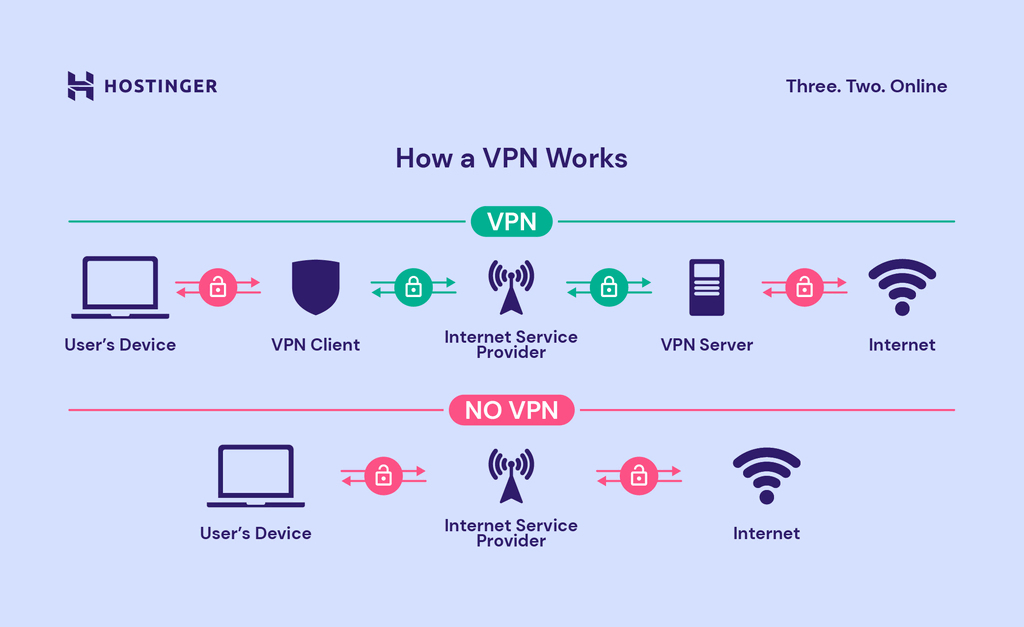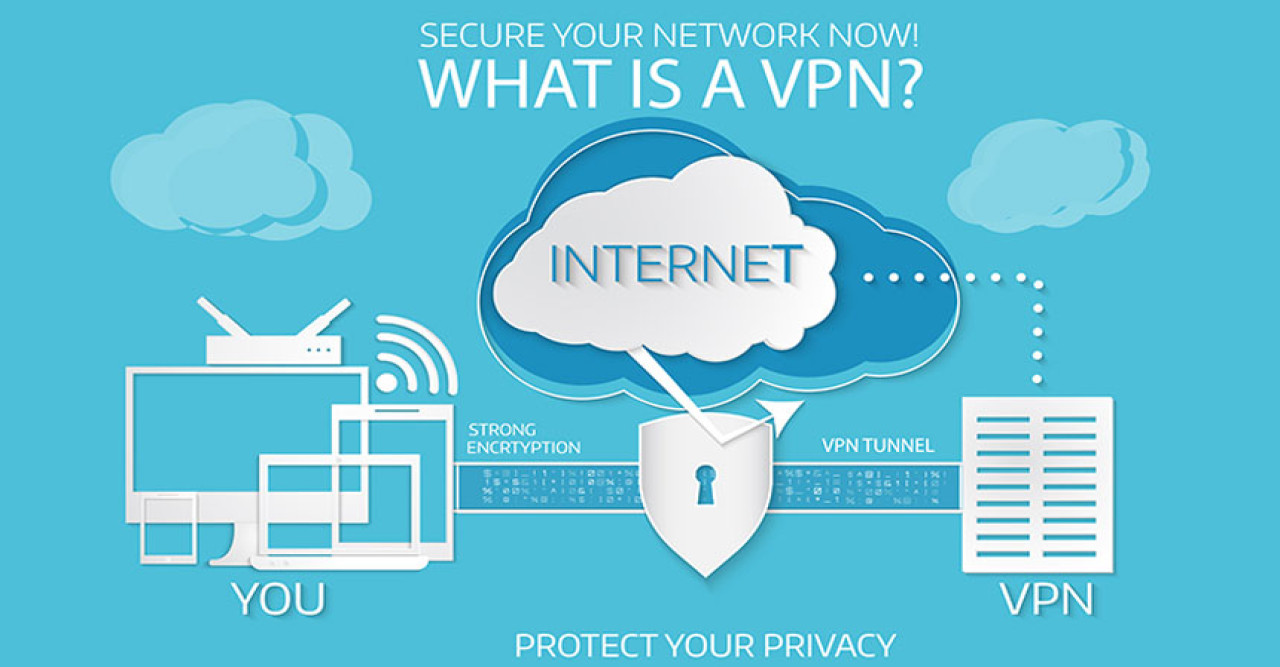A VPN (Virtual Private Network) encrypts your internet connection, enhancing privacy and security. It masks your IP address, protecting your online activities.
A VPN is essential for several reasons. It ensures secure browsing on public Wi-Fi, preventing hackers from accessing your data. It also helps bypass geo-restrictions, allowing access to content unavailable in your region. Many users appreciate the anonymity it provides, as it hides your online actions from ISPs and third parties.
Businesses benefit from VPNs by securing remote work connections. In essence, a VPN offers a safer, more private internet experience. Its growing popularity underscores its importance in today's digital age.

Credit: www.hostinger.com
How Vpn Works
Understanding how a VPN works can help you appreciate its importance. A VPN, or Virtual Private Network, offers secure internet connections. This is achieved through various technologies and methods. Two of the most important aspects are encryption and tunneling protocols.
Encryption Basics
Encryption is like a secret code for your data. It scrambles your information so only authorized parties can understand it. Here are some key points about encryption:
- Data Encryption: Converts readable data into an unreadable format.
- Decryption: Converts encrypted data back into its original form.
- Keys: Special codes used for encrypting and decrypting data.
Modern VPNs use strong encryption methods. Common methods include AES-256 and RSA. These ensure that your data remains private and secure.
Tunneling Protocols
Tunneling protocols create a secure path through the internet. They help protect your data as it travels. Here are some popular tunneling protocols:
| Protocol | Features |
|---|---|
| OpenVPN | Open-source, highly secure, and flexible. |
| PPTP | Fast but less secure. |
| L2TP/IPsec | Combines L2TP with IPsec for better security. |
| IKEv2/IPsec | Stable, secure, and good for mobile devices. |
Each protocol has its strengths and weaknesses. Choose the one that best suits your needs for speed and security.
By using strong encryption and effective tunneling protocols, VPNs provide a secure and private online experience. This makes them essential for anyone who values online privacy and security.

Credit: www.kaspersky.com
Types Of Vpns
Understanding the different types of VPNs helps you choose the best one for your needs. There are two main types of VPNs: Remote Access VPN and Site-to-Site VPN. Each serves a unique purpose and has distinct advantages.
Remote Access Vpn
A Remote Access VPN allows individual users to connect to a private network. This type is ideal for remote workers or travelers. They can access their company's network from anywhere.
Benefits of Remote Access VPN:
- Security: Encrypts your internet connection.
- Flexibility: Work from any location.
- Cost-Effective: No need for physical hardware.
Site-to-site Vpn
A Site-to-Site VPN connects multiple networks at different locations. This is common for businesses with multiple branches. It allows seamless communication between offices.
Benefits of Site-to-Site VPN:
- Scalability: Connects many locations easily.
- Efficiency: Reduces the need for multiple remote access VPNs.
- Security: Ensures safe data transfer between branches.
| Feature | Remote Access VPN | Site-to-Site VPN |
|---|---|---|
| Usage | Individual Users | Multiple Networks |
| Security | High | High |
| Cost | Low | Variable |
Key Features Of Vpn
Understanding the key features of a VPN helps you make an informed choice. A VPN, or Virtual Private Network, offers many benefits. Below, we explore some of the most crucial features that make VPNs indispensable.
Anonymity
Anonymity is one of the primary reasons people use VPNs. A VPN hides your IP address. This makes your online actions untraceable. Websites and services cannot see your real location. This is crucial for privacy.
Additionally, VPNs prevent your internet service provider (ISP) from tracking your browsing history. Your online activity remains confidential. This is especially important on public Wi-Fi networks.
Security Protocols
VPNs use different security protocols to protect your data. These protocols encrypt your internet traffic. This makes it unreadable to hackers and other third parties. Here are some common VPN security protocols:
| Protocol | Description |
|---|---|
| OpenVPN | Open-source and highly secure. Popular among many VPN providers. |
| IKEv2/IPsec | Known for speed and stability. Great for mobile users. |
| WireGuard | New and fast. Offers strong security with less code complexity. |
| L2TP/IPsec | Combines Layer 2 Tunneling Protocol with IPsec for security. |
| SSTP | Developed by Microsoft. Works well on Windows platforms. |
Choosing the right protocol can enhance your VPN experience. Consider your needs and preferences.
Benefits Of Using A Vpn
Using a VPN offers many advantages. It can make your online activities safer. It also helps you access content that might be restricted. Below are some key benefits of using a VPN.
Enhanced Privacy
Enhanced privacy is a major benefit of using a VPN. It hides your IP address, making you anonymous online. Websites and apps can't track your real location. This keeps your personal data safe from hackers and spies.
VPNs also protect your browsing history. This means your internet service provider (ISP) can't see what you do online. Your data stays private and secure.
Access To Restricted Content
A VPN lets you access restricted content. Some websites and streaming services block content based on location. With a VPN, you can bypass these restrictions. You can watch shows and movies from other countries.
Here are some examples:
- Netflix libraries from different countries
- BBC iPlayer from the UK
- Blocked social media sites
Using a VPN also helps with accessing regional news websites. You can stay informed no matter where you are.
| Benefit | Description |
|---|---|
| Enhanced Privacy | Makes you anonymous online, protecting personal data. |
| Access to Restricted Content | Allows access to geographically restricted websites and services. |
Common Vpn Use Cases
Understanding the common use cases for a VPN can help you see its value. Below are some of the most frequent scenarios where a VPN proves beneficial.
Streaming Services
Many people use VPNs to access streaming services. You might want to watch a TV show or movie that is not available in your country. A VPN can help you bypass geo-restrictions. This way, you can enjoy content from Netflix, Hulu, or BBC iPlayer no matter where you are.
VPNs also help in avoiding throttling by your ISP. Sometimes, your internet provider slows down your connection when you stream. By using a VPN, you can maintain your streaming speed and enjoy buffer-free content.
Public Wi-fi Protection
Public Wi-Fi is convenient but not always safe. Hackers can easily steal your data on public networks. Using a VPN provides an extra layer of security. It encrypts your data, making it hard for hackers to access it.
Whether you are in a coffee shop, airport, or hotel, a VPN keeps your information safe. You can browse, shop, and bank online without worrying about cyber threats.
Choosing The Right Vpn
Choosing the right VPN is crucial for online security and privacy. With many options available, it can be challenging to decide. Here’s a guide to help you pick the best VPN for your needs.
Factors To Consider
Several factors can influence your decision. Understanding these will help you make an informed choice.
- Security Features: Look for strong encryption and a no-logs policy.
- Speed: Ensure the VPN offers fast connection speeds.
- Server Locations: More servers mean better access to global content.
- Device Compatibility: Check if the VPN supports your devices.
- Ease of Use: Choose a VPN with a user-friendly interface.
- Customer Support: Reliable customer support is essential.
- Cost: Compare prices and look for deals or free trials.
Top Vpn Providers
Here are some top VPN providers known for their excellent service.
| VPN Provider | Key Features |
|---|---|
| ExpressVPN | High speed, 94 countries, 24/7 support, strong encryption. |
| NordVPN | Double VPN, CyberSec, 60 countries, great security. |
| CyberGhost | 45-day refund, 89 countries, user-friendly, good for streaming. |
| Surfshark | Unlimited devices, 65 countries, budget-friendly, CleanWeb. |
Choosing the right VPN is essential for your online safety. Consider these factors and providers to make an informed decision.
Potential Drawbacks Of Vpn
VPNs offer many benefits, but they are not perfect. It's important to understand the potential drawbacks before using one. Below are some key issues you might face.
Speed Reduction
One common drawback is speed reduction. VPNs encrypt your data, which can slow down your internet. This happens because the data has to travel through a VPN server. This extra step can cause delays.
Some VPNs are faster than others. It's wise to choose a VPN known for good speed. Speed can vary based on:
- Server location
- Server load
- Encryption strength
Compatibility Issues
Another issue is compatibility. Not all devices or software work well with VPNs. Some websites and apps may block VPN traffic. This can make it hard to access certain services.
Here are some common compatibility issues:
| Issue | Description |
|---|---|
| Streaming Services | Some services block VPNs to enforce geo-restrictions. |
| Banking Apps | Some banks may flag VPN traffic as suspicious. |
| Corporate Networks | Some companies restrict VPN use for security reasons. |
Always check if your essential services work well with a VPN before subscribing.
Future Of Vpn Technology
The future of VPN technology is exciting and promising. VPNs are becoming essential for privacy and security. As technology evolves, VPNs must adapt to new challenges and opportunities.
Emerging Trends
Several trends are shaping the future of VPN technology. These trends aim to improve security, speed, and user experience.
- Quantum-Resistant Encryption: Quantum computers can break current encryption. VPNs will use quantum-resistant algorithms to stay secure.
- Decentralized VPNs: Traditional VPNs have central servers. Decentralized VPNs use peer-to-peer networks for better privacy.
- Improved Speeds: New protocols like WireGuard offer faster connections. Users will enjoy smoother and quicker browsing.
- AI and Machine Learning: AI can detect and block threats in real-time. VPNs will use AI to enhance security and performance.
Integration With Other Technologies
VPNs are integrating with other technologies to offer better services. This integration aims to provide a seamless and secure online experience.
| Technology | Integration Benefits |
|---|---|
| IoT Devices | Secures smart home devices from cyber threats. |
| 5G Networks | Offers faster and more reliable VPN connections. |
| Cloud Services | Enhances data security for cloud storage and applications. |
These integrations will make VPNs more versatile and user-friendly. Users can expect better protection and convenience.

Credit: www.expressvpn.com
Frequently Asked Questions
Why Would I Need A Vpn?
A VPN enhances your online privacy, secures your data, and allows access to restricted content. It masks your IP address and encrypts your internet connection, ensuring safe and anonymous browsing.
When Should You Use A Vpn?
Use a VPN when accessing public Wi-Fi, protecting your privacy, bypassing geo-restrictions, securing online transactions, or avoiding tracking.
What Is The Benefit Of Using Vpn?
Using a VPN enhances online privacy and security. It encrypts your internet connection, hiding your IP address. Access geo-restricted content and browse safely on public Wi-Fi.
How Much Does A Vpn Cost?
VPN prices range from $3 to $15 per month. Costs vary based on features and subscription length.
Conclusion
VPNs provide essential online privacy and security. They encrypt your internet connection and hide your IP address. Using a VPN ensures safe browsing on public Wi-Fi networks. It also helps access geo-restricted content. For enhanced digital freedom and protection, consider using a VPN.
Stay secure and enjoy unrestricted internet access.

















